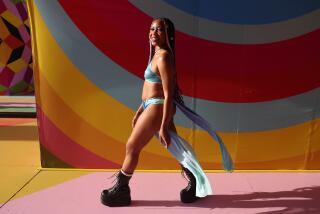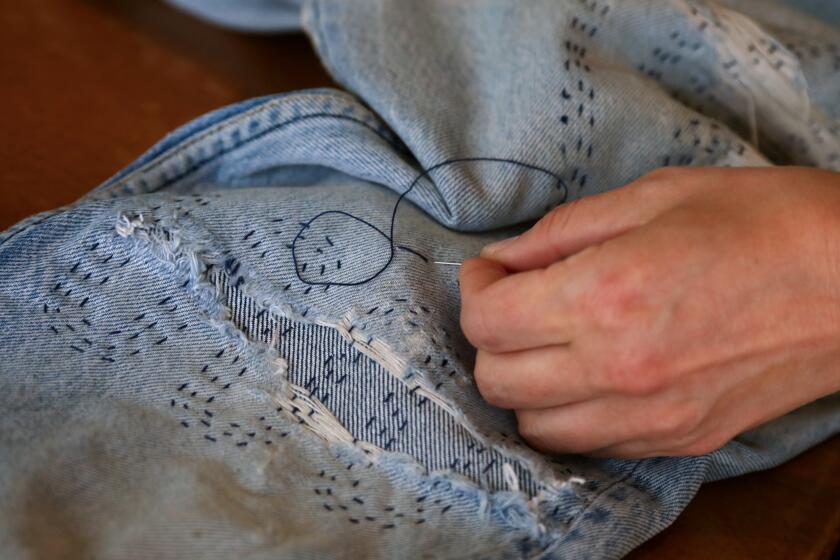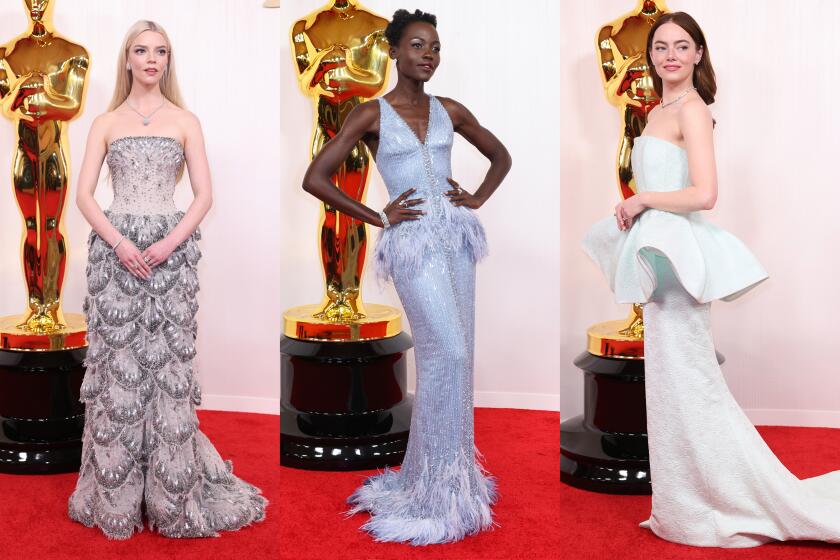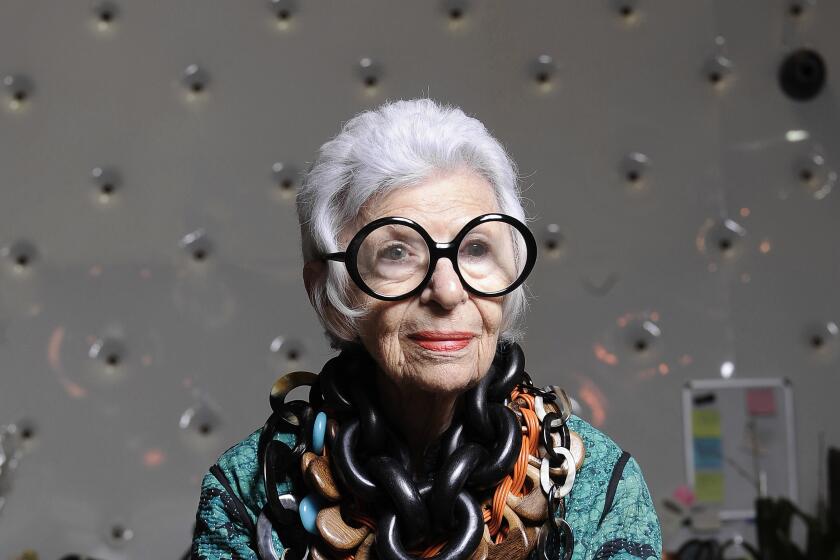How ComplexCon wrapped allure, streetwear and ‘something new’ into one festival
The hype beasts were waiting. Dressed in tie-dyed T-shirts and oversized carpenter pants, in printed hoodies and voluminous shorts, wearing Air Jordan 1s and with arms heavily tattooed, they waited. It was just before 8 a.m. on a cool morning in early November and members of the crowd stood, slumped, leaned or splayed themselves on the cement outside the Long Beach Convention Center waiting to be let inside.
They were waiting for the start of ComplexCon, the two-day festival akin to a Disneyland of streetwear. ComplexCon attracts tens of thousands of guests, counts American Express and Jameson whiskey among its sponsors, and charges anywhere from $60 to $600 for tickets.
For the record:
1:15 p.m. Nov. 15, 2019An earlier version of this story said Isis Arias was the executive director of ComplexCon. Arias is the executive producer of ComplexCon.
This year’s festival included a marketplace, moderated panel discussions with notable tastemakers, musical performances and an alfresco food court of trendy items served from trucks.
Moving beyond print
ComplexCon debuted in 2016 as the event arm of Complex, the media company that started as a magazine in 2002. (The first event in Long Beach included performances by Snoop Dogg, Travis Scott, Kid Cudi and Skrillex.)
Founded by fashion designer Marc Ecko, the magazine covered streetwear culture when it was still relatively underground. Although the magazine no longer exists, the company has expanded its scope to include podcasts, videos and social-media content. This summer there was the launch of ComplexCon in Chicago. So what’s the secret behind the success of ComplexCon?
“There were already trade shows,” said Christian Baesler, president of Complex Networks. “There were already music festivals. There were already food festivals. But we wanted to combine in a way you could only see here.”
“I hope they have the best ... time ever,” said Isis Arias, executive producer of ComplexCon, when asked what she hoped attendees felt upon their exit. “It’s not really about what you’re purchasing. It’s about: Did you eat something new? Did you experience something new? Did you learn what a podcast was? Things like that would make me happy.”
For media companies and lifestyle brands like Vogue, GQ and Goop, ComplexCon might provide a road map for finding alternative revenue streams and a lesson in how to stay relevant with millennials.
Although Arias’ primary goal isn’t necessarily the swipe of a credit card, the festival’s vast marketplace is its core. Complex Chief Executive Rich Antoniello told the Wall Street Journal earlier this month that $25 million in retail sales were made for vendors last year. This year, he said, organizers expected to surpass that number. (On Wednesday, a representative said retail sales totals for this year haven’t been released.)
Inside the festival
In Long Beach, the convention center floor was filled with setups that ranged from traditional booths to elaborate spectacles. Some brands outdid themselves to assert dominance.
Puma, the event’s official footwear sponsor, built a mini carnival, complete with Skee-Ball and prizes. Reebok and Billionaire Boys Club built a rocket ship outfitted with a DJ and plopped in a martian landscape.
Artist Takashi Murakami, a member of the host committee, erected a faux museum and a ceramics gallery. Old Spice, an event sponsor, created a “shoe spa,” while L.A.-based brand Rhude built a simulacrum of the Rose Bowl Flea Market.
Dylan Johnson, who’s in his early 30s, was waiting in line to buy one of the limited-edition archival pieces from Rhude. “I’ve never been, but my friend comes every year and keeps telling me to come — that it’s great,” he said.
Johnson, who lives in Venice and works at a political consultancy firm, said streetwear is the main influence in the fashion industry. “There’s a status element to it,” he said. “If you have something rare or sought after, it shows you have knowledge about the culture or the industry. Scarcity is a big part of it. Hip-hop and black culture is basically the mainstream culture now.”
The convention floor was a feast for the senses with the smell of marijuana wafting through the halls to the brightly-colored, Instagram bait on sale. Many vendors — the popular store Union, athletic brand Champion, MLB and Complex’s own merchandise — riffed on local sports team logos and styles of the Dodgers and Lakers. Offering limited-edition pieces, labels appeared to whip up frenzied excitement. Hip-hop music served as the event’s de facto soundtrack, and celebrities including Pharrell Williams, who has been involved with the event since its start, and Lil Yachty made the rounds.
Mike Cherman of the brand Chinatown Market got his start at ComplexCon, with a booth at the inaugural edition. Since then his brand has gained popularity in the streetwear scene. Also, Chinatown Market has collaborated with Converse and Puma and dressed the likes of Jay-Z and Wiz Khalifa.
“There’s a change of guard happening,” he said. “[ComplexCon] has gotten bigger. You see more corporate money here now. It’s not the thing it was and it goes to show you that streetwear is now pop culture. It’s mass market. For a lot of people, it can be hard to accept that their ‘thing’ has gotten bigger.”
Business consultancy firm Strategy& (part of PWC) and streetwear website Hypebeast released a report earlier this year that estimated that the global streetwear market was valued at $185 billion and encompassed brands ranging from Nike to Supreme.
Although streetwear had been a niche industry, it has become a fascination for the fashion establishment in recent years. Louis Vuitton collaborated with Supreme, for example, for the fall 2017 season, and brands such as Valentino and Gucci have mirrored streetwear’s stylistic gestures.
One couldn’t help but marvel at the lines snaking around the convention floor as young men and women waited to pay hundreds of dollars for limited-edition merchandise. However, big brands such as Adidas and Nike, which once held prime spots at ComplexCon, pulled out of the festival in recent years. That’s surprising considering Nike appeared to be the most-represented shoe brand on the feet of attendees. (The NikeCraft Mars Yard by Nike and artist Tom Sachs and the Virgil Abloh-designed Air Jordan 1 Retros were popular.)
Although ComplexCon is more glitzy and has more at stake financially, it might look like a funeral for some — the death throes of a subculture becoming part of the establishment. This isn’t anything new. It happened to the rock ’n’ roll, hippie, punk and grunge scenes in decades past.
None of this seemed to matter to Clay Cook, who had paid $225 for an early entrance ticket and waited in line at the Vlone booth where he had hoped to buy a T-shirt or two.
Standing there, Cook, who’s in his early 20s, wore a vintage tee and track pants, a collaboration between Nike and Cactus Flea Market, and was carrying a tote bag that Abloh made for the Swedish furniture brand Ikea. A number of people were carrying the bag, which had been released the day before.
“It’s just … it’s huge,” Cook said. “The sneaker industry is like this $4-billion-dollar market or something.” He then looked around, taking it all in. “It’s just insane.”
More to Read
Sign up for our L.A. Times Plants newsletter
At the start of each month, get a roundup of upcoming plant-related activities and events in Southern California, along with links to tips and articles you may have missed.
You may occasionally receive promotional content from the Los Angeles Times.






